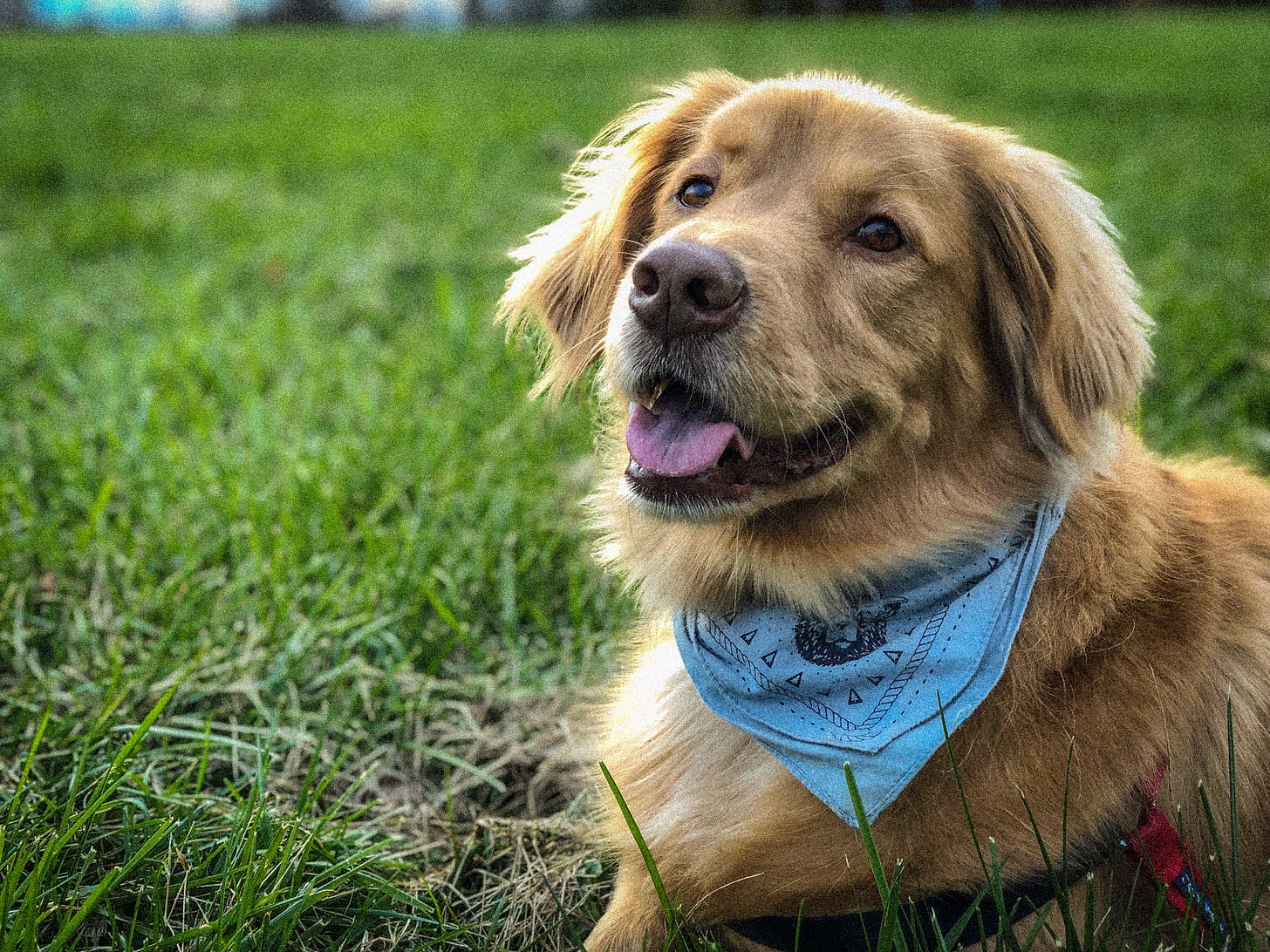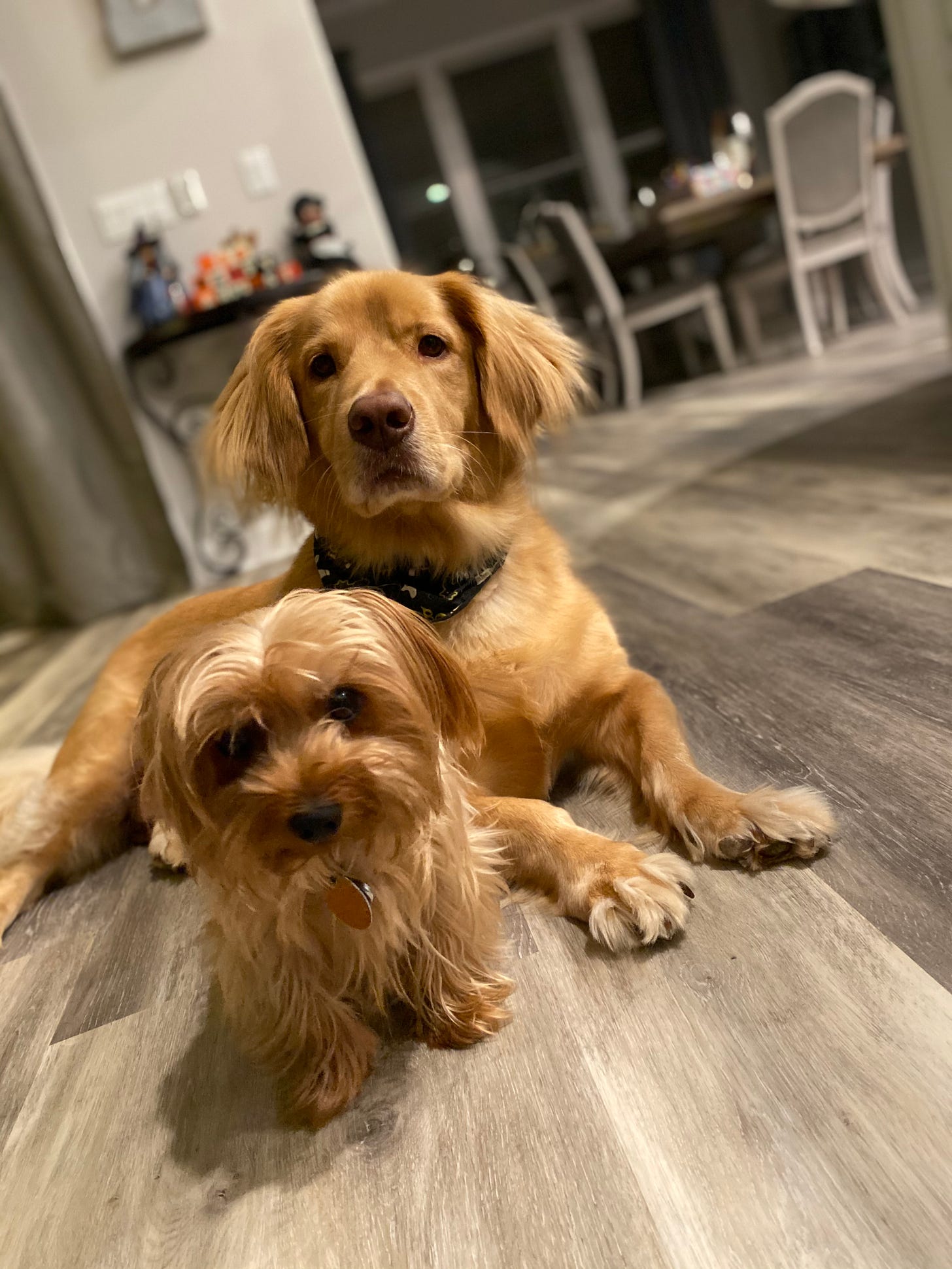We co-exist with miniature wolves.
Dogs are a by-product of humanity's compulsion to control our environment.

I love to call Duncan a “mini-wolf.” Obviously he isn’t a wolf, and he doesn’t look like a wolf (though he is damn handsome), but dogs are the descendants of wolves our long-ago H. Sapiens ancestors co-existed with and subsequently domesticated. It’s hard to overstate just how fascinating a relationship humans have with dogs. In the US, there are around 78 million dogs. This fact alone is astounding.
Think about dogs for a second, then think about every other species of animal you’ve ever seen. Think about the lions you saw on the Zoobooks as a kid and think about the lion you saw when you went to the zoo. Think about Harambe and compare him to the gorillas you’ve seen as you listened to David Attenborough narrate their daily lives. Think about Jaws and how you know what all Great white sharks look like because of them. They all look roughly the same, only really varying in size and maybe color pattern.
No animal species on Earth has the biodiversity that dogs have. When you see a Yorkie on the street, you know it’s a dog. The same is true for a Siberian Husky or whatever else breed you see. All dogs have four legs, but their noses and snouts are different, their ears are different, their coats are different. All cats also have four legs, but you’d never mistake a cat for a dog. Why? Try to put into words the qualifiers that make you immediately label a cat a cat and a dog a dog. It’s hard to describe, but you know which is which. Even stranger: Breeds of dogs look very different, yet they can mate with one another and produce fertile offspring (the biological species concept is what defines members of the same species as being able to produce fertile offspring). The story of how wolves went from fierce predators to compassionate allies is still hotly contested in science.
There’s a lot to consider with this. I could digress into evolution; Wolves co-existed with humans for a long time, then humans domesticated wolves and probably selectively bred them to the point where it explains dogs becoming a separate species (and current-day Gray Wolves) and then the literally hundred-plus breeds that exist today.
I could also wax poetic on something else that’s been on my mind lately: My sweet bear Duncan and I live together at the same time today, but we’ve actually been together, in a different sense, for billions of years. The atoms the comprise my body have existed, in one form or another, since the Big Bang. The same thing is true for the atoms that make up Duncan, and that make up this computer, and that make you up, dear reader, and that made up my sister. In that way, I’ve known Duncan for eternity, but it wasn’t until atoms came together that made up my consciousness. My sister is gone and I miss her every single day, but when I think about the fact that she is still here in many ways, and the atoms that made her up remain in the Universe, I feel peace. I like thinking about this. I think it’s cool to separate ourselves from the small fraction of time that is our days.
But what I really want to talk about is that the existence of dogs aligns with a fundamental characteristic of Homo sapiens: Our incessant need to control the environment around us.
Now, I’m thankful that we have dogs. Dogs provide us happiness, support, love, and outlets for our energy. I think dogs are good, and assuming the dog is well-behaved and no one has an allergy, I think every kid should grow up with a dog if possible. But dogs are not playthings, they aren’t hobbies, and they are absolutely not something to be taken lightly. Nobody should get a dog unless they can provide it the care that it needs.
With the benefit of hindsight, it makes sense that we domesticated and selectively bred dogs. We climbed up the animal kingdom ladder due to our advanced brain: Our ability to strategize and develop tools allowed us to overcome our shortcomings — no particularly strong attributes like speed, size, or armaments — and kill even the strongest predators. It shouldn’t be a surprise that our predecessors found a way to co-exist and eventually ally with wolves.
In the long term, a new species developed: dogs. We chose to emphasize, intentionally and accidentally surely, attributes that would help them be better workers for us, whether that was retrieving, hunting, swimming, or herding. They became our workers. They’re members of our packs, our families. They love us and we love them. (Selective breeding isn’t inherently bad, at least in regards to crops or animals, but it obviously can be a slippery slope that people use to justify eugenics in humans.)
At one point, it was necessary to do what was needed to survive. We became close with wolves to survive, and they mutually benefitted because they would also get rewards for helping. This is seen in nature elsewhere; Remora fish attach to whales and they have a mutually beneficial relationship. Our need to control our environment used to benefit us, but nowadays, it manifests elsewhere.
I’ve struggled quite a bit with anxiety. Anxiety and CF are not an ideal match. I’m frequently concerned about my lung function and if I’ll wake up tomorrow with a cold, flu, or flare-up. It can be beneficial to think towards the future, to prepare. But anxiety manifests more as worrying, and it’s usually detrimental. I’d argue that the same reason — our desire for control — we became apex predators that eventually “overcame” evolution and conquered the world also explains several other issues: Our need to develop conspiracy theories, why we refuse to battle climate change, why so many of us struggle with anxiety and depression, and why we have dogs at all.
My hope with this newsletter/blog (not sure what I’m calling it yet) is to write thoughts like this in this sort of format. I’ve thought a lot about our relationships with dogs — mostly mine with Duncan — and a lot of the other tangentially-related thoughts in this piece. I want to expand on a lot of them, but most of the time, I write and nothing becomes of them since they don’t feel like they’d fit well on trelarosa.com.
This piece feels like something that could be expanded in a lot of different directions, so I’ll probably touch on a lot of this eventually.
I’m very thankful for the response I received the other day from the first post. Several people responded and gave good feedback. I’m not sure if you’re able to comment? My Aunt told me it wouldn’t allow her, so you may have to make a free Substack account (it’s a really cool site, so maybe not a bad idea anyhow!). Please respond with any feedback, thoughts, or whatever else! I’m sincere when I say this: This writing is fun because it encourages discussion and I don’t want to take up too much space! I want to chat with others more! Again, I will share responses on here, too!
If you feel compelled to share this and encourage others to subscribe, that would mean a great deal to me. Thanks again, sincerely.
And in conclusion, this picture of my son Duncan and my adorable nephew Harley (Alyssa loved him dearly):

TL



